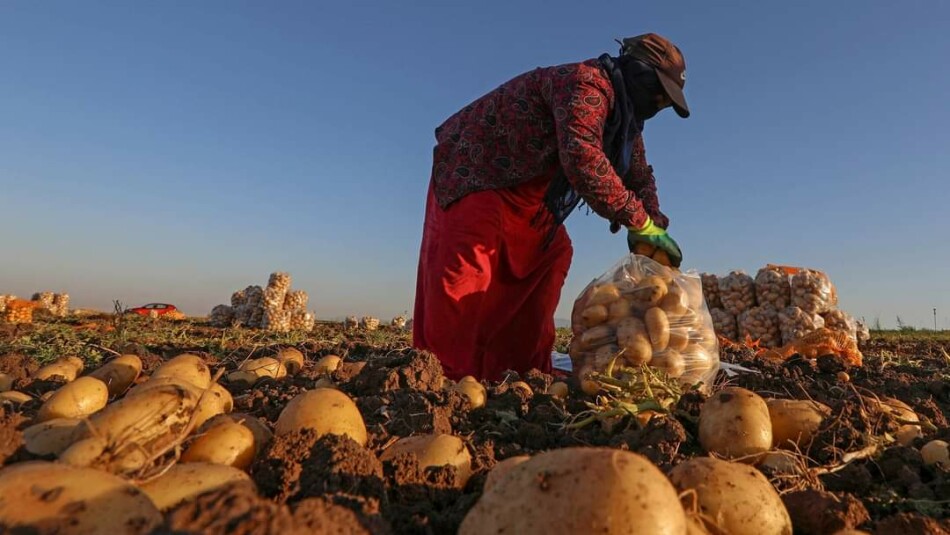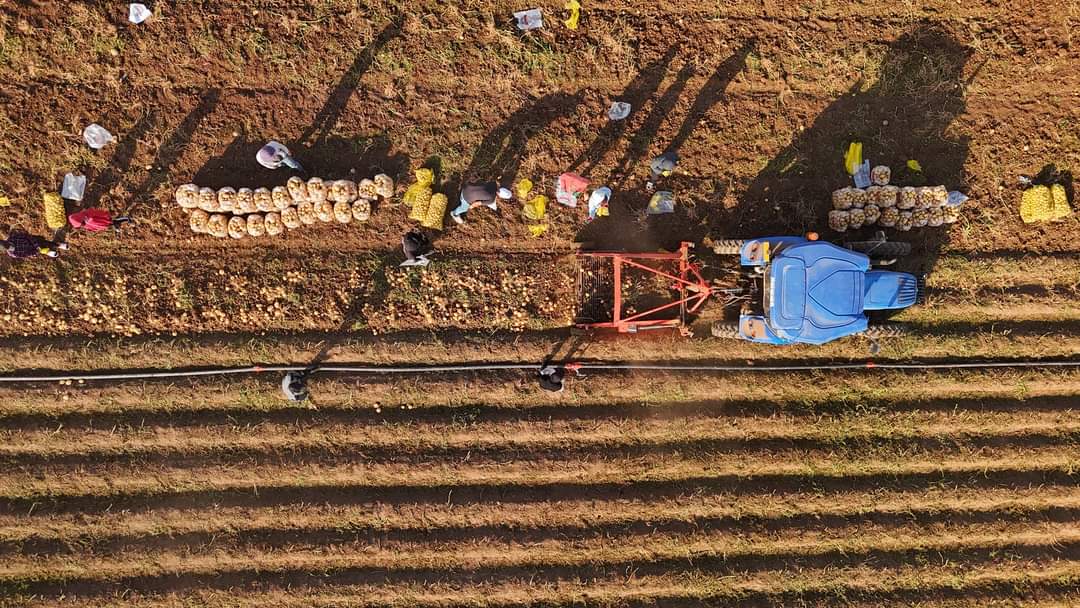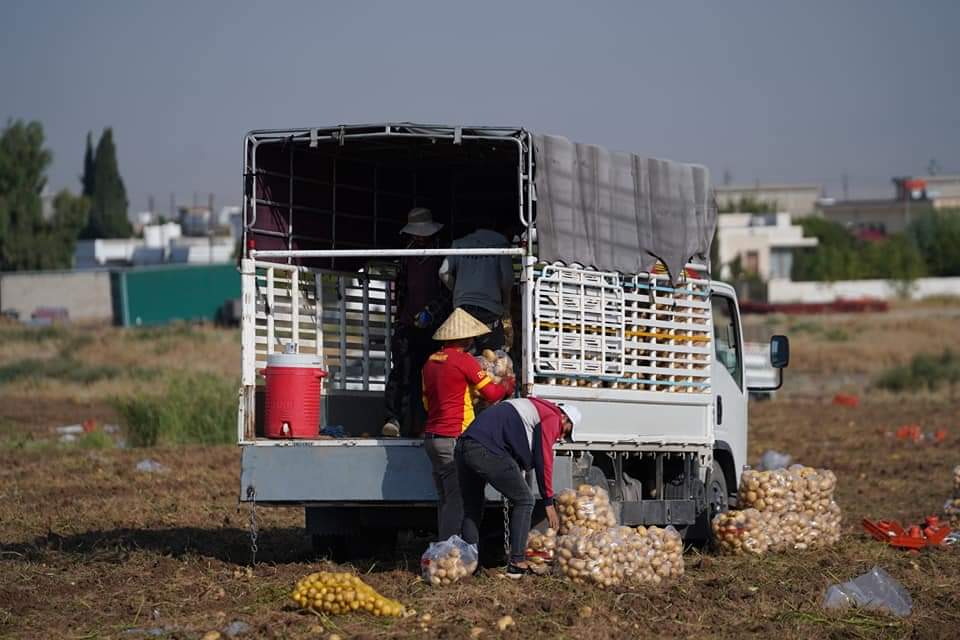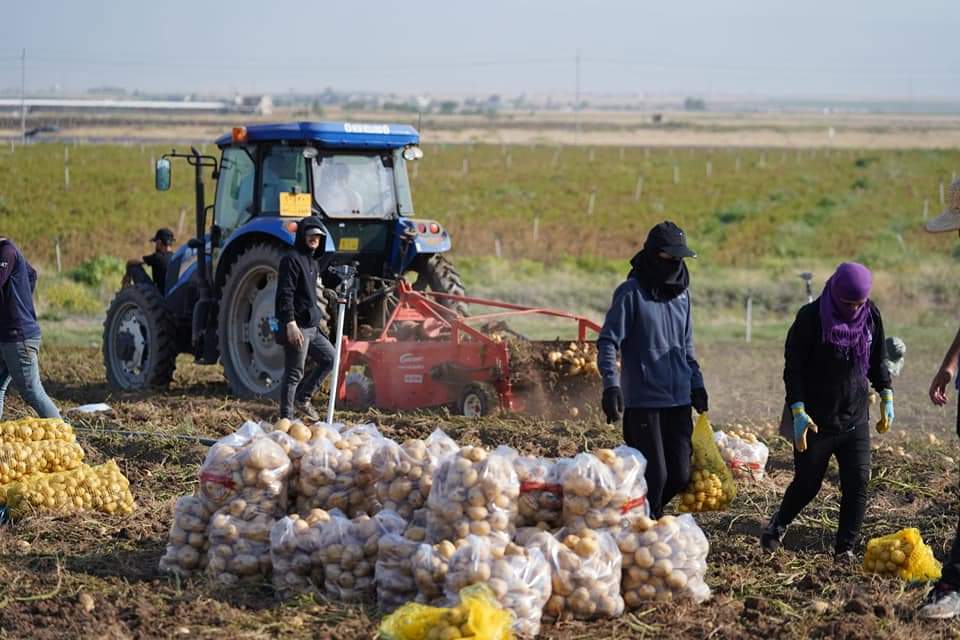
The slope of Mount Maqloub was like a landfill until three years ago, but now it has been transformed into fields extending as far as the eye can see, producing potatoes and providing job opportunities for dozens of women.
Mount Maqloub is located in Sheikhan District. The area was a source of odors emanating from the waste, which also distorted its appearance, to the point that Khosro Raouf thought of implementing an environmental and economic project that would change the reality of the area.
For the past three decades, waste has been dumped in the area, which covers an area of 2,500 hectares, 30 kilometers km from the city of Mosul and 80 km from Dohuk Province.
These lands are located near the Khazir River and are part of Nineveh Province, but administratively they are affiliated with Dohuk Northern Province. The slope of the mountain has now become a center for potato production, where hundreds of workers, most of them women, work.
Breathing Life into Dead Land
Khosrow Raouf, who owns part of the land, decided with other farmers in the area to clean up the land and started the project in cooperation with agricultural and environmental experts and a number of government departments.
“We collected thousands of tons of waste that had been thrown in the area randomly over 30 years,” Raouf said.
After cleaning the land, they used advanced equipment to check the suitability of the soil for agriculture, which took 20 months of inspection and follow-up.
“After ensuring that there were no harmful elements in the soil that would affect crops and human health, we decided to extend an irrigation network from the Khazir River,” Raouf said.
“The plan was to clean and monitor the land so that it would become fertile and suitable for agriculture. The Khazir River was important for this step,” Raouf added.
“We prepared sandy soil after using chemical treatment to increase the elements that the soil had lost due to waste and residues.”
He was proud of he made with the help of local departments.
“For example, the land needed an acidic substance to balance it, so we used some chemicals.” The next step was planting potatoes.
All farmers in the area decided to plant potatoes from February to March, and from here the land was transformed from a vast area of waste that was harmful to the region into a fertile agricultural field.

Potato production fields in the Maqlub Mountain slope in Sheikhan District, Nineveh, September 2024. Saja Ismaeel
Life returns to Mount Maqlub
Three years after this step, 2,500 hectares of land became fields for producing potatoes and dozens of other agricultural crops. Mohammed says that he never imagined that a mountain of waste and debris would turn into a field that exports its produce aborad.
"I now own a large area, I established a company specializing in potato production, 200 people work for me, 160 of them are women," he defiantly told KirkukNow
The foothills of Mount Maqlub in the Sheikhan district, which is located within the borders of Nineveh Province and administratively affiliated with Dohuk Province, are now one of the most fertile lands in the region.
Nineveh Province is distinguished by its fertile lands, which gave it the first agricultural rank among the Iraqi Provinces, but the sector declined during the past decade due to the repercussions of the war against the Islamic State of Iraq and Syria ISIS and the scarcity of water in some areas.
According to statistics from the Nineveh Agriculture Directorate, the province provides 60% of Iraq's need for wheat and barley, and the government is currently planning to expand the area of agricultural land, describing its efforts over the past two years as an "agricultural revolution," according to what the Director of Nineveh Agriculture, Rabie Youssef Elias, said in a previous statement to (KirkukNow).
Thirty percent of the lands on the slopes of Mount Maqlub, which represent a model for returning to agriculture, are owned by a farmer called "Uncle Rahim."
Uncle Rahim said that when he saw the piles of waste, he did not expect at first glance that the land would one day become one of the largest potato production fields.
Iron and steel, household waste, and plastic materials covered the land, in addition to tons of waste that had penetrated the ground.
Uncle Rahim pointed out that "potatoes were the first crop we planted because potatoes grow well, then we started planting other crops. As we now plant, in addition to potatoes, cowpea crops, sunflowers, tarrouzi (squash), wheat, and barley."

Workers transport potatoes from the fields of the Maqlub Mountain slope in Sheikhan District, Nineveh, September 2024. Saja Ismail
Women get the lion's share of job opportunities
Picking and collecting potatoes is the main task of the workers, and Uncle Rahim sees it as an "easy" job that benefits women more.
"Cleaning these lands of waste has created job opportunities for hundreds of families," in addition to that, the environment of the area has become cleaner.
Over 100 people work daily, 80 of them women, in Uncle Rahim's agricultural field.
If this land had not been cleaned, we would not have had job opportunities. I want to continue my work
Sahar Amin, one of the workers in the field, heads to work every day from 4 am until around 10 am.
"Our job as women is to pick potatoes, while the men do the transportation. I think our work is much easier. We get a daily wage of 15,000 dinars ($10), which secures our livelihood," according to Sahar.
After the workers arrive at the field, breakfast is served, and at 10 am, they are given another meal.
"They treat us well. If we or our children get sick, they give us a day off, and they provide transportion as well. I always say, if this land had not been cleaned, we would not have had job opportunities. I want to continue my work," Amin says.
Iraq ranks fifth among countries most affected by climate change repercussions, encompassing water scarcity, drought, rising temperatures, pollution, and other natural calamities, per United Nations UN data and warnings,
Najiba Ali (43 years old), a farmer living in the Kalakachi sub-district of Sheikhan, says, "My husband died in a traffic accident. I took on the burden of raising my four children. Cleaning this land of waste secured our livelihood."
Nineveh ranks first in Iraq in potato production, with the areas planted with this crop reaching more than 2,900 hectares, with a production approaching 124,000 tons a year, according to statistics from the Central Statistical Organization for the year 2022. The total area of land planted with potatoes all over Iraq during the same year amounted to more than 5,000 hectares, with a production capacity of 270,000 tons.
The Iraqi Ministry of Agriculture exported more than 30,000 tons of potatoes to the Gulf Countries GCC during 2022, despite not stopping imports. Potatoes are plants that consume large amounts of water, and they grow best in soil with a high degree of acidity.
"Year after year, our production of potatoes increases, which is one of the most famous types of potatoes, and we export quantities of it to the rest of the provinces and outside Iraq," Raouf says.
Rizgar Mohammed, a university student, has been working in the agricultural field since the beginning of its revival three years ago. He says that this step helped him secure university expenses.
"I am happy that 80% of the job opportunities are allocated to women."
In each of the districts of Sheikhan, Aqra, and Bardarash, 200 to 250 tons of waste are collected daily by a company contracted with the Kurdistan Regional Government KRG. The three districts are close to Mount Maqlub, which until three years ago was a dumping ground for the region's waste.

The difficult task: How to turn soil full of toxins into fertile land
Tahseen Kuran, the director of Bardarash Agriculture, one of the participants in the land revival process, said, "To implement this step, we benefited greatly from the Khazir River. Besides, the soil of the region is fertile and suitable for agriculture. For this reason, quantities of potatoes have been exported outside the province during the past three years."
Potatoes are considered a staple food consumed by more than two-thirds of the world's population, and they are crops that can withstand drought, cold, and lack of fertility, according to the UN, which expects global potato production to increase by 112% to reach 750 million tons by 2030.
Lava Barzan, doctorate degree in agriculture, says that one of the problems facing lands contaminated with plastic waste and metal waste is the difficulty of using them for agriculture because they contain some types of bacteria and the waste interacts with the soil.
Barzan, who was among the experts who examined the soil, said, "After cleaning the land, it was not possible to grow crops in it because of the interaction of some toxic materials that pose a danger to human health and the soil."
The area was full of waste and war remnants.
"The soil was mixed with heavy metal waste that posed a danger to the stomach and exposed humans to cancer," Barzan added, "The first step was to remove the toxic materials. We used chemical and physical treatment. We investigated a lot about how to get rid of these harmful materials."
The Khazir River made the task much easier for us. After getting rid of the harmful materials, the lands were washed directly with water. The process took about a year and eight months.
After washing the land, the soil was re-examined, and it turned out that it needed some other elements.
"The soil's pH was low, so it was not scientifically suitable for agriculture. We also addressed this problem."
The task, according to Barzan, required a lot of thinking and planning. Some steps of the process would not have succeeded with human capabilities alone.
"For example, examining the land, plowing it, and spraying natural fertilizers on tens of thousands of dunams. We needed very advanced equipment. We are talking about thousands of dunams. I can say that the success of the project would have been impossible without the waters of the Khazir River."
Natural fertilizers consist of livestock and poultry waste, Barzan says.
"Sometimes we made fertilizers from various foods so that life would return to the land. We provided the soil with the elements it was missing."
She believes that the government and citizens must cooperate to avoid what happened with the lands of the foothills of Mount Maqlub and other areas.
"Raising awareness is everyone's mission."